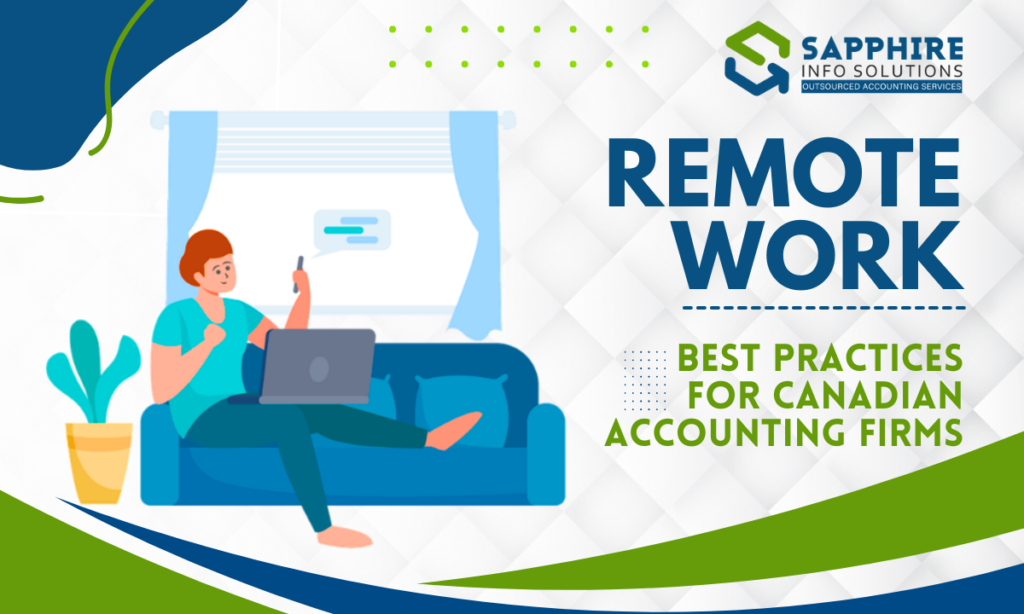Introduction
In today’s ever-evolving business landscape, remote work has become the new norm. Canadian accounting firms are no exception to this trend, as they seek ways to adapt and thrive in the digital era. With the right practices in place, remote work can prove to be highly successful for accounting firms, leading to increased productivity, improved client satisfaction, and even cost savings.
In this article, we will explore the best practices for Canadian accounting firms when it comes to remote work. From leveraging technology to effective communication strategies, we will delve into the key steps that can help accounting professionals maintain efficiency and collaboration while working remotely.
Furthermore, we will address the unique challenges that may arise in the remote work environment and provide practical solutions to overcome them. Whether it’s ensuring data security or maintaining work-life balance, Canadian accounting firms can adopt specific practices to navigate these obstacles successfully.
Join us as we dive into the world of remote work for accounting firms, uncovering effective strategies and valuable insights to help Canadian firms excel in the new era of work.
Benefits of Remote Work for Canadian Accounting Firms
Remote work offers numerous benefits for Canadian accounting firms. Firstly, it allows for increased flexibility, enabling employees to work from anywhere, at any time. This flexibility can lead to improved work-life balance and increased job satisfaction, resulting in higher employee retention rates.
Secondly, remote work can lead to increased productivity. Without the distractions of a traditional office environment, accounting professionals can focus on their tasks more efficiently. Additionally, remote work eliminates the time and energy wasted on commuting, allowing employees to dedicate more time to productive work.
Lastly, remote work can result in cost savings for accounting firms. By embracing remote work, firms can reduce overhead costs associated with office space, utilities, and other expenses. This can lead to significant savings in the long run, allowing firms to allocate resources to other areas of their business.
Overall, remote work offers a range of benefits for Canadian accounting firms, from increased flexibility and productivity to cost savings.
Challenges of Implementing Remote Work in the Accounting Industry
While remote work offers many advantages, there are also challenges that accounting firms may face when implementing this work model. One of the primary challenges is ensuring effective communication and collaboration among remote teams. Without face-to-face interactions, it’s crucial to establish clear communication channels and utilize technology tools to facilitate seamless collaboration.
Another challenge is maintaining data security. Accounting firms deal with sensitive financial information, and it’s essential to have robust cybersecurity measures in place to protect client data. Remote work introduces additional vulnerabilities, as employees may be accessing sensitive information from their home networks. Implementing strong security protocols and educating employees on best practices can help mitigate these risks.
Work-life balance can also become a challenge in a remote work environment. Without clear boundaries between work and personal life, employees may find it difficult to disconnect and recharge. Encouraging regular breaks, setting realistic expectations, and promoting a healthy work-life balance can help address this challenge.
Addressing these challenges is crucial for accounting firms to ensure a smooth transition to remote work and maintain productivity and security.
Best Practices for Setting Up a Remote Work Infrastructure
To successfully implement remote work, Canadian accounting firms should establish a robust infrastructure that supports productivity and collaboration. Here are some best practices to consider:
- Invest in the right technology: Provide employees with the necessary hardware, software, and tools to perform their work efficiently. This may include laptops, remote access software, cloud-based accounting platforms, and collaboration tools.
- Ensure reliable internet connectivity: Remote work heavily relies on internet connectivity. Encourage employees to have a stable internet connection and consider providing backup options in case of outages.
- Establish virtual communication channels: Set up communication channels such as video conferencing, instant messaging, and project management tools to facilitate seamless communication and collaboration among remote teams.
- Create a centralized document management system: Utilize cloud storage solutions to store and share documents securely. Implement proper access controls to ensure confidentiality and data integrity.
- Provide training and support: Offer training sessions and resources to help employees adapt to remote work tools and technologies. Establish a support system to address any technical issues or challenges employees may encounter.
By following these best practices, Canadian accounting firms can create a strong remote work infrastructure that fosters productivity and collaboration.
Communication and Collaboration Tools for Remote Accounting Teams
Effective communication and collaboration are vital for remote accounting teams. Here are some essential tools that can facilitate seamless collaboration:
- Video conferencing: Platforms like Zoom or Microsoft Teams allow for face-to-face interactions, making meetings more engaging and fostering team cohesion.
- Instant messaging: Tools like Slack or Microsoft Teams provide real-time communication, enabling quick and efficient information sharing among team members.
- Project management software: Platforms like Asana or Trello help teams organize and track project progress, ensuring everyone is on the same page and meeting deadlines.
- Cloud-based accounting platforms: Software such as QuickBooks Online or Xero enables accountants to access financial data securely from anywhere, streamlining their work processes.
- Virtual whiteboarding and collaboration tools: Tools like Miro or Google Jamboard allow teams to brainstorm, collaborate, and visualize ideas in a virtual setting.
Implementing these tools can enhance communication and collaboration within remote accounting teams, leading to improved efficiency and productivity.
Cybersecurity Considerations for Remote Accounting Firms
Ensuring data security is of utmost importance for remote accounting firms. Here are some cybersecurity considerations to keep in mind:
- Use strong passwords: Encourage employees to use unique and complex passwords for their work accounts and implement two-factor authentication whenever possible.
- Secure Wi-Fi connections: Advise employees to use secure, password-protected Wi-Fi networks and avoid public Wi-Fi for work-related tasks.
- Encrypt sensitive data: Utilize encryption tools to protect sensitive client data during transmission and storage.
- Regularly update software and hardware: Keep all software, operating systems, and devices up to date with the latest security patches to prevent vulnerabilities.
- Implement access controls: Limit access to sensitive data and systems only to authorized personnel. Regularly review and update access permissions as needed.
By implementing these cybersecurity measures, accounting firms can mitigate the risks associated with remote work and protect client data.
Remote Work Policies and Guidelines for Canadian Accounting Firms
Having clear remote work policies and guidelines is essential for maintaining consistency and ensuring that employees understand expectations. Here are some key elements to include in remote work policies:
- Eligibility criteria: Clearly outline who is eligible for remote work, considering factors such as job roles, performance, and tenure.
- Work hours and availability: Define expected work hours and specify how employees should communicate their availability to colleagues and clients.
- Communication protocols: Establish guidelines for virtual communication, including response times, preferred channels, and etiquette.
- Performance measurement: Define how performance will be measured in a remote work environment, including key metrics and evaluation criteria.
- Data security and confidentiality: Outline protocols for protecting client data, including guidelines on data access, storage, and disposal.
Regularly review and update these policies to ensure they align with the evolving needs and challenges of remote work.
Tips for Managing Remote Accounting Teams Effectively
Managing remote accounting teams requires a different approach compared to traditional office settings. Here are some tips for effective remote team management:
- Establish clear expectations: Clearly communicate goals, deadlines, and performance expectations to ensure everyone is on the same page.
- Promote regular check-ins: Schedule regular team and one-on-one meetings to provide updates, address concerns, and foster team cohesion.
- Encourage open communication: Create a culture that encourages open and transparent communication, where team members feel comfortable sharing ideas, concerns, and feedback.
- Recognize achievements: Acknowledge and celebrate individual and team achievements to boost morale and motivation.
- Provide ongoing support: Offer resources, training, and mentorship opportunities to help remote employees develop professionally and feel supported.
By implementing these management practices, accounting firms can effectively lead their remote teams and ensure their success.
Conclusion: Embracing Remote Work in the Future of the Accounting Industry
Remote work has become an integral part of the accounting industry in Canada. By embracing remote work best practices, accounting firms can reap the benefits of increased flexibility, productivity, and cost savings. However, it’s crucial to address the challenges that come with remote work, such as effective communication, data security, and work-life balance.
By implementing the right infrastructure, utilizing communication and collaboration tools, and prioritizing cybersecurity, Canadian accounting firms can navigate the remote work landscape successfully. Additionally, establishing clear policies, providing ongoing support, and learning from successful case studies can help firms effectively manage their remote teams.
In the new era of work, remote work is here to stay. By embracing these best practices, Canadian accounting firms can position themselves for success and excel in the digital age.





